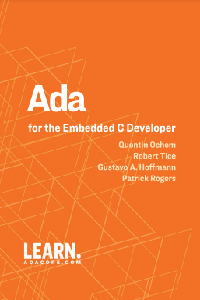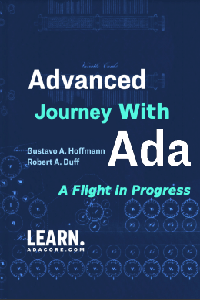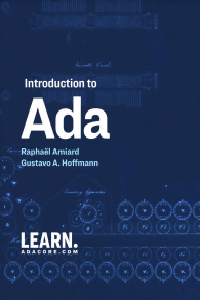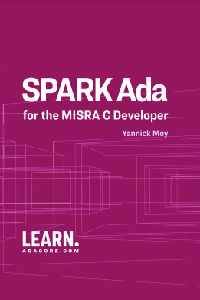Sort by
|
1984 (Nineteen Eighty-Four)
1984 (Nineteen Eighty-Four) is a novel written by the English author George Orwell. The book falls into the dystopian social science fiction genre. Dystopian means relating to an imagined world that is undesirable or frightening. And social science fiction explores human society and behavior. The novel was published in 1949. It popularized [...]

Ada for the C++ or Java Developer
This guide introduces the Ada programming language for experienced C++ or Java developers. It covers all core Ada concepts through numerous side-by-side code examples that map constructs between the languages. The document helps readers rapidly develop a working knowledge of Ada by leveraging their existing skills in C++ or Java. It covers [...]

Ada for the Embedded C Developer
This book presents an introduction to the Ada programming language for embedded C developers, exploring its benefits for safety-critical systems through clear comparisons to C syntax and providing practical guidance on real-time, multithreading, and verifying concurrent programs using SPARK and static analysis tools.

Advanced Journey with Ada
A Flight in Progress
This textbook provides an in-depth technical reference on Ada’s advanced features. It builds upon core fundamentals by delving into intricate language details through rigorous but accessible explanations and examples. Key topics include advanced data types, controlled visibility, OO, contracts, generics and exception handling. Developers learn how to optimize programs and solve sophisticated [...]

Around the World in Eighty Days
The French author Jules Verne wrote the novel Around the World in 80 Days. First, it was published in parts by Le Temps newspaper from November 7 to December 22, 1872. Then, on January 30, 1873, it was released as a complete adventure novel. It is considered one of Verne’s most acclaimed [...]

Database Design
This open textbook presents a complete guide to database design principles and practice. It aims to equip students and professionals with skills to develop robust, maintainable database systems using the relational model. The textbook covers fundamental concepts and advances to modeling, normalization, transactions and administration. Practical exercises reinforce learning. Recommended for: Beginner [...]

Introduction to Ada
This comprehensive beginner’s guide introduces the Ada programming language. It provides an overview of Ada’s history and design philosophy emphasizing safety, reliability and maintainability. The tutorial explains core syntax and programming constructs through numerous code examples. It also covers advanced features like packages, generics, exceptions and concurrency. Later sections address technically demanding [...]

Introduction to Ada: Laboratories
This workbook complements the Introduction to Ada online textbook by providing over 150 hands-on exercises. Spanning 18 chapters, it offers a learn-by-doing approach to help readers develop practical skills in Ada programming. The exercises directly apply concepts from the Introduction to Ada tutorial, reinforcing learned topics through realistic problems. Early labs focus [...]

Introduction to Spark
This tutorial introduces the SPARK language and its associated analysis tools. It explains key differences from Ada that enable formal verification. Readers learn about adding basic contracts and analyzing code with tools like GNATprove. Advanced topics like state abstraction and ghost code are demonstrated. Numerous examples of varying complexity cement understanding. Recommended [...]

Introduction to the GNAT Toolchain
“Introduction to the GNAT Toolchain” is a comprehensive tutorial aimed at beginners who want to set up an Ada development environment using the GNU Ada (GNAT) toolchain. The book provides step-by-step guidance on installing and configuring the necessary build tools for compiling and managing Ada projects from the command line. It focuses [...]

Spark Ada for the MISRA C Developer
This technical resource compares the SPARK subset of the Ada programming language and its verification tools to the MISRA C coding standard. It outlines issues in C like weak typing and undefined behaviors that make analysis difficult. The document shows how SPARK/Ada addresses these through language features and principles, enforcing properties like [...]

The Man Who Knew Too Much
"The Man Who Knew Too Much: And Other Stories" is a 1922 collection of detective stories by the renowned English writer G.K. Chesterton. The collection features the character of Horne Fisher, "the man who knew too much" about the private politics behind the public affairs of the day.
